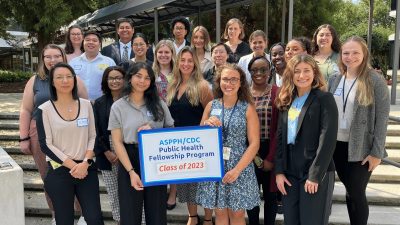The Abstract: October 23, 2023

October 23, 2023
Whether you’re local or global, student or alumni, the Abstract’s weekly news digest will help you stay in the loop with our amazing Gillings School community.
Areza, Johnson named ASPPH/CDC public health fellows

ASPPH is pleased to welcome 22 new fellows who will engage in practice-based training assignments through the ASPPH/CDC Public Health Fellowship Program. (Image courtesy of ASPPH.)
Congratulations to Julci Areza, MPH, and Joanne Johnson, MPH, two recent Gillings School alumni who have been named to the 2023 class of public health fellows through a program administered by the Association of Schools and Programs of Public Health (ASPPH) and the Centers for Disease Control and Prevention (CDC).
The ASPPH/CDC Public Health Fellowship Program aims to support a culturally relevant and applied mentored learning experience for early career professionals with graduate degrees in public health. This next generation of public health leaders will have an opportunity to round out their academic training and gain practical public health experience through exposure to state-of-the-art technology and databases, acquisition of skills and knowledge to enhance their careers, and interaction with technical experts in their chosen fields.
For the next 12 to 24 months, Fellows’ training will follow eight tracks in 11 different CDC Centers/Institutes/Offices (CIOs). The separate tracks will allow the fellows to strengthen their capacity in the focus areas that interest them most. Ultimately, upon completion of the ASPPH/CDC Public Health Fellowship Program, fellows will have made useful contributions to projects of national public health importance that are related to the mission of the CDC, while gaining a significant skillset that will set the foundation for their own public health careers.
Learn more about the fellowship.
Ranapurwala receives CDC grant funding to examine role of minimum wage, COVID-19 and discrimination

Dr. Shabbar Ranapurwala
Congratulations to Shabbar Ranapurwala, PhD, assistant professor of epidemiology, and his team for receiving a new $1.2 million, three-year grant from the CDC to examine the association of state minimum wage policies, COVID-19 and related economic impact payments, and racial discrimination on community violence including firearm violence in the United States.
Violent deaths are responsible for the most years of life lost among people 18 to 50 years old in the U.S. Further, violence inflicts a disproportionate burden on racial and ethnic minorities in the U.S., thereby exacerbating existing health inequities, including those amplified by COVID-19. Although the physical distancing policies put in place to address the COVID-19 pandemic reduced social interactions, violence-related injury and homicides increased in 2020 in the U.S. Structural and policy interventions that target the social-ecological framework can attain sustainable reductions in multiple forms of violence. Given that poverty is one of the drivers of violence, increasing minimum wage may be a potent policy intervention for violence prevention. However, minimum wage increase laws have not been evaluated as a community violence prevention method. Further, several states increased minimum wage during 2020 and 2021, providing a unique opportunity to examine whether such increases can prevent community violence during the pandemic.
The team’s study will address three important questions:
1) What role do minimum wage increases play in community violence prevention?
2) Does minimum wage increase or lack thereof differentially affect community violence among different demographic groups (race/ethnicity, sex, age, and rurality)?
and
3) How has the COVID-19 pandemic impacted community violence and if state minimum wage increases and economic impact payments played a role in mitigating pandemic effects?
Learn more about the new funding.
UNC ranks #4 worldwide in HIV/AIDS citation impact
The University of North Carolina ranks No. 4 worldwide in citation impact for HIV/AIDS research, according to data from the UNC Center for AIDS Research.
Gillings faculty receive funding for new studies
Faculty and researchers at the Gillings School continue their research to make an impact on public health. Here are a few newly funded studies and the topics they are exploring:
- Anna Austin: Overdose Data To Action (NC DHHS – DPH)
- Nora Franceschini: Mentored Training in Molecular Epidemiology of Chronic Kidney Disease in Diverse Populations (NIDDK)
- Hongtu Zhu: Mapping the Causal Genetic-Imaging-Clinical Pathway for Alzheimer’s Disease (NIA)
- Stephen Hursting: Preclinical Investigations into Next Generation Incretin Therapy for Breaking the Obesity-Breast Cancer Link (Breast Cancer Research Foundation)
- Eric Whitsel: The Epidemiology & Somatic Genomic Pathogenesis of Radon-Related Stroke (NIEHS)
